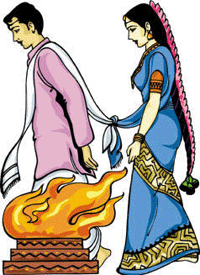Marriages are considered to be one of the core traditions of Indian culture. Every time there’s a discussion on marriage, many people use traditions and culture as an argument to support the traditional mode of marriages, or even the arrange marriages. In this article, I will explain how the traditional marriages today are not that traditional and how modernization is the right way to connect to our roots. The term modernization has been used so that we can understand and interpret our traditional texts and practice them in the modern world. It is always a good idea to comprehend the culture well, rather than accepting it with closed eyes, just for the sake of it.
First of all we need to understand our origins, so that we can derive conclusions about our traditions. Here, the reference to the Vedic texts is imperative. The reason for that is only through Vedas we can connect to our roots and it’s the Vedas that define the pillar of Hinduism. According to Vedas, marriage is one of the Ashrams in human life, referred as Grihastha Ashram. There are four Ashrams in totality – Brahmacharya, Grihastha, Vanprastha, Sanyas Ashram, each lasting for the span of twenty one years. At the end of the Brahmacharya Ashram, a man is expected to get married. If he doesn’t want that, he may skip this Ashram and directly get in to the Vanprastha Ashram. However his relatives and parents have every right to convince him for the marriage. So far we are as per the guidelines of Vedas.
Now let’s get in to the falsified notions that people have about our traditions when it comes to marriage.
The first argument that people use is that – arrange marriages are the traditional way of choosing your life partner and therefore the right one. Love marriages on the other hand are considered wrong and a harmful effect on our society from the western culture. Those who use this argument do not understand the concept of Vedic marriage. There are six kinds of marriages that have been mentioned in Rig-Veda. One of those six forms is Brahma Vivah. Brahma Vivah – is a marriage blessed by God, in which a young man and woman fall in love with each other and decide to get married. According to Rig Veda, parents should encourage such a marriage. This is essentially a form of love marriage and therefore a part of tradition, and not a western effect.
Another myth is about the ceremonies that are to be conducted during the marriages. As per Vedas, all the mantras have to be chanted by the bride and groom, and the family members. There is no mention of exchanging gifts during the marriage. However what we see in today’s marriages – a Pundit ji chanting all the mantras. There is hardly anything that bride and groom do in their marriage ceremonies, except listening to those chants. This is due to the fact that Brahmin community started involving themselves in various ceremonies and marriage was one of them. They introduced many variations in it and ultimately it became all about inviting Brahmins(Pundit ji) to all the ceremonies and offering presents to them.
One serious issue that comes again and again is that of inter-caste marriages. And people oppose them again by using culture as an argument. The critical thing that we need to learn is that the castes never existed in the Vedic age. Caste system is again a divide created by some people of the following generations for their own benefits. And if we talk about Varnas which are altogether different from castes, the Vedas are not very strict whether one should marry a girl from same Varna or not. Instead more focus has been given on the education and intelligence of two people who are willing to get married. Also, the Varnas are not determined by the birth but by individual’s Karma. Therefore, Varnas are more like your profession than your caste.
Marriage remains an institution even today as it was in the Vedic era. The idea of marriage in our culture is a beautiful one but unfortunately, we hardly follow that idea. We are more concerned about the rituals that have later been added to the marriages. If we follow Vedic understanding, marriage is one of the sixteen Samskaras that one needs to do in their lives in order to move towards intelligent manifestation. The idea will be far more graceful if we practice it in its original form.

No comments:
Post a Comment